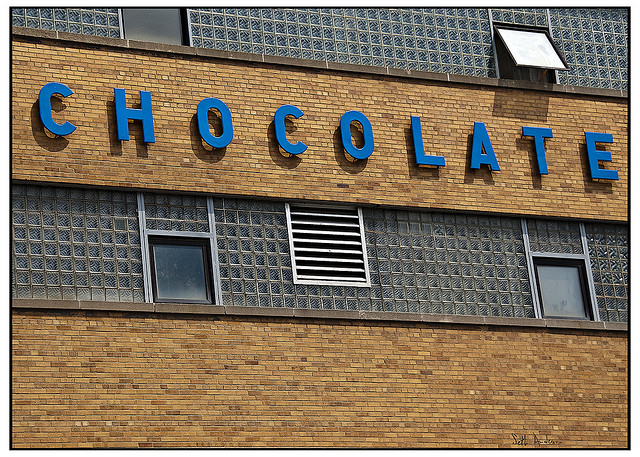Blommer, where ‘the bridges smell like chocolate’
By Robin Amer

Blommer, where ‘the bridges smell like chocolate’
By Robin Amer
I wish I could remember which one of my friends made this brilliant quip last summer: “Riding my bike by Blommer’s. Hot as an oven and smells like chocolate. Now I know what it feels like to be a brownie.”
I’m paraphrasing here, after searching in vain for the original tweet or Facebook posting. It made me laugh out loud at the time, a laugh of recognition. Maybe you’ve smelled it too, just like I’ve smelled it a million times, riding my bike east across the river on Grand Avenue on my way to work. That thick, sweet, unmistakable odor emanating from Blommer Chocolate Company’s West Loop factory is as quintessentially Chicago as the nearby bascule bridges. The smell was even featured in a 2006 This American Life segment, in which reporter Jorge Just describes the Blommer’s smell as “the smell of magic.”
Of course, as Just goes on to say, not everyone loves the smell. In 2006, one anonymous neighbor complained about the odor to the federal Environmental Protection Agency, which told the chocolate company it was in violation of the 2001 Clean Air Act for sending too much cocoa dust into the air. Blommer (which rhymes with Hummer) told the EPA it was already installing a new filtration system and new emissions control equipment, which it did, and was never fined. The Beachwood Reporter’s Steve Rhodes tried to FOIA the identity of the complainant in 2006, but to no avail. He eventually got papers back – in 2010 – but the chocolate-averse “yuppie” (as the BR’s Steve Yaccino called him or her) was never outed, and the chocolaty smell remains. I for one, am glad, but I don’t own a condo in the West Loop.
Here are some things I didn’t know about Blommer Chocolate, despite my familiarity with its distinctive urban perfume, until I heard a recent talk by a Blommer account executive named Mike Auda. Founded in town in 1939, the company claims to be North America’s largest chocolate maker, grinding 45 percent of the continent’s cocoa at plants in California, Pennsylvania and Ontario, in addition to the one at Kinzie and Desplaines. They have a sizable team of commodities experts and futures traders to help them acquire all the raw materials they need – the cacao, the milk, the artificial sweeteners – to run such a massive operation.
If you’ve never come across their products, it’s because Blommer sells almost exclusively business-to-business and almost entirely in bulk – a product pamphlet on their website lists chocolate chunks and drops available in palettes of 1,800 or 2,400 lbs. You can’t walk into the Jewel across the street from their plant and buy a bag of mini-Blommers, but you may be getting their product when you buy other name-brand candy, or a chocolate-coated ice cream bar. And if you’re really jonesing, they do sell ten pound bars at their factory storefront. (The average chocolate bar is only 1.5 oz., so don’t the whole thing all at once!)
I also learned from Auda what it really means to make chocolate on an industrial scale: For starters, not all of what the company makes can actually be called “chocolate.” I thought it was only the French who had such strict regulations – about what can be called a croissant or a patisserie, for instance – but we have our own quality control measures, too. In the audio above, Auda explains why the thing you think you’re buying – at the grocery store, at least – may not really be chocolate in the eyes of the U.S. government, even if it comes from Chicago’s own chocolate company.
Dynamic Range showcases hidden gems unearthed from Chicago Amplified’s vast archive of public events and appears on weekends. Mike Auda spoke at an event presented by Culinary Historians of Chicago in July. Click here to hear the event in its entirety.